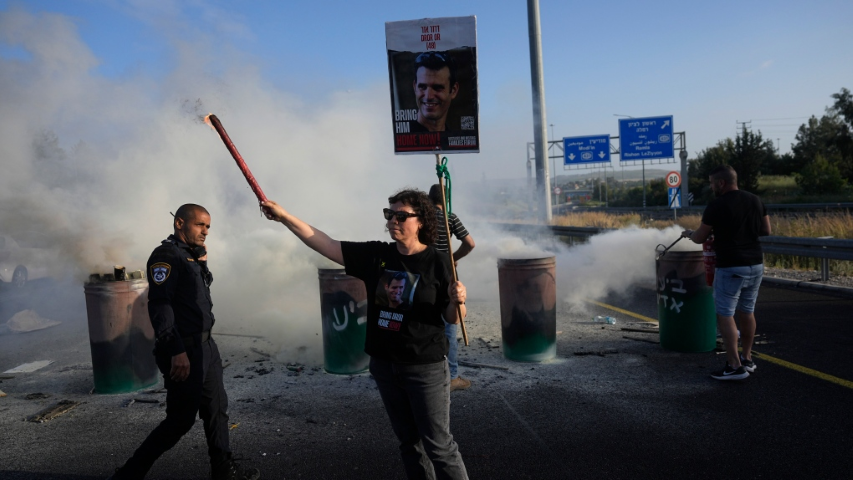
Family members of people held captive in the Gaza Strip stopped traffic on Highway 1, the main road connecting Tel Aviv and Jerusalem, demanding the release of all hostages on Friday, April 19, 2024. (Photo: AP/Ohad Zwigenberg)
World leaders are urging Iran and Israel to calm down after a reported Israeli airstrike near an Iranian air base and nuclear site. The Group of Seven (G7) foreign ministers, meeting in Italy, warned Iran of potential new sanctions for its recent drone and missile attack on Israel. They also called on both Iran and Israel to avoid making the situation worse.
In response, Israel carried out another strike on Iran, this time near the central city of Isfahan. This comes after Iran's drone and missile attack on Israel over the weekend.
Israel also targeted an air defense unit in southern Syria, causing damage, according to Syria's state-run news agency.
Tensions in the region have been high since the start of the Israel-Hamas conflict in October. The conflict began when Hamas and Islamic Jihad, both supported by Iran, attacked Israel, killing many people and capturing others. Israel then launched an offensive in Gaza, resulting in widespread destruction and casualties.
Recent events include an airstrike on a base used by Iran-backed militias in Iraq, injuring three members. While the responsible party is unclear, some militia officials blamed U.S. forces.
The Popular Mobilization Forces (PMF) in Iraq, comprised mostly of Shiite, Iran-backed groups, have been targeting U.S. forces in retaliation for their support of Israel during the conflict with Hamas.
Israel is also investigating the deaths of two Palestinian detainees who died while being transported from Gaza. Rights groups claim detainees have been mistreated and abused in Israeli custody.
Meanwhile, violence continues in the West Bank, where an Israeli raid on a refugee camp killed at least four Palestinians, including militants.
A pro-Israel think tank suggests that Israel's recent strikes indicate a desire to avoid escalating tensions with Iran. However, the situation remains volatile, with the risk of further conflict.
In Paris, police arrested a man outside the Iranian consulate, prompting heightened security measures. The incident comes amid growing tensions in the Middle East.
The head of the UN's atomic watchdog confirmed that there was no damage to Iran's nuclear facility after the reported Israeli airstrike. This follows speculation about the potential impact on Iran's nuclear program.
Remnants of a missile were found near Baghdad, raising questions about possible involvement in the recent attacks between Iran and Israel.
In response to the heightened tensions, S&P downgraded Israel's credit rating, citing the risk of military escalation. This is the second major U.S. credit agency to do so, following Moody's downgrade due to the conflict with Hamas.
The European Union imposed sanctions on extremist Jewish settlers and radical organizations accused of violence against Palestinians in the West Bank. The move aims to address human rights abuses in the region.
Turkish President Erdogan criticized both Iran and Israel for their actions, while also condemning U.S. support for Israel. He reaffirmed Turkey's support for Palestine and announced plans to host Hamas leaders.
U.S. Secretary of State Antony Blinken stated that the U.S. was not involved in offensive operations in the region but reaffirmed its commitment to Israel's security.
Russia, a key ally of Iran, conveyed Iran's desire to avoid further escalation to Israel. However, tensions remain high, with concerns about the potential for a larger conflict.
World leaders, including those from Germany and the European Commission, called for calm and urged Iran and Israel to avoid further escalation. The situation remains tense, with ongoing violence and diplomatic efforts to defuse tensions.















